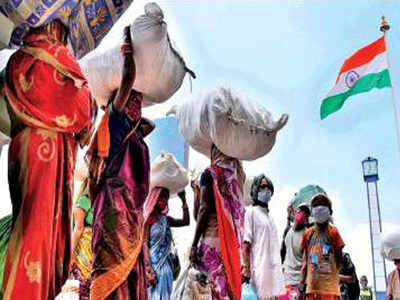
LUCKNOW: Extending another way to strengthen households of migrant workers who have returned to the state after the lockdown, the state government has taken a unique route.
The women in such households will be given opportunities to earn a living through enrolment in self-help groups (SHGs).
These SHGs, under the State Rural Livelihood Mission, aim to make women self-reliant and economically productive. It includes both women who have returned from other districts themselves as well as those whose husbands or other family members have lost jobs.
The SHGs will not only make women in the families of migrant workers secure but also contributors to the home in times of crisis.
Take the example of Siddharthnagar, which has got the maximum number of migrants—1.5 lakh—among all districts.
“We profiled all women who came back to the district from other states as well as those who had such men in the families who were migrants and had lost jobs,” said district development officer of Siddharthnagar Sheshmani Singh.
The SHGs are involved in work like stitching, including that of school uniforms, embroidery, nursery plantation, art and craft.
Of the 1.5 lakh, at least 60,000 have been almost continuously employed under MNREGS. They are working on the routine jobs under MNREGS, varying every month. In June, they were engaged in digging of ponds and cleaning of drains.
“Usually, about 45,000 labourers work under MNREGS in the district in June. This year, we had at least a lakh. This made a difference for the district also,” said Singh.
“Besides, there have been constant efforts to get others employed as well based on their skills,” he said.
While unskilled workers have been employed under MNREGS, the skilled ones, after skill mapping, are being trained under self-employment schemes and encouraged to start their own business, said Singh, who is an official in the rural development department.
The latest training to have been imparted to them was in mushroom farming. Plantation of nurseries, poultry, goat farming and construction of public toilets are other means that have provided employment to migrants.
“Goatery is a profitable venture. A young one may be sold for Rs 5,000,” said the official.
To make the employment process more efficient, the government is planning to organise camps where senior officers would visit to establish communication with migrants.
“This is to listen to their problems and find out what they expect from the government,” said the official.
The women in such households will be given opportunities to earn a living through enrolment in self-help groups (SHGs).
These SHGs, under the State Rural Livelihood Mission, aim to make women self-reliant and economically productive. It includes both women who have returned from other districts themselves as well as those whose husbands or other family members have lost jobs.
The SHGs will not only make women in the families of migrant workers secure but also contributors to the home in times of crisis.
Take the example of Siddharthnagar, which has got the maximum number of migrants—1.5 lakh—among all districts.
“We profiled all women who came back to the district from other states as well as those who had such men in the families who were migrants and had lost jobs,” said district development officer of Siddharthnagar Sheshmani Singh.
The SHGs are involved in work like stitching, including that of school uniforms, embroidery, nursery plantation, art and craft.
Of the 1.5 lakh, at least 60,000 have been almost continuously employed under MNREGS. They are working on the routine jobs under MNREGS, varying every month. In June, they were engaged in digging of ponds and cleaning of drains.
“Usually, about 45,000 labourers work under MNREGS in the district in June. This year, we had at least a lakh. This made a difference for the district also,” said Singh.
“Besides, there have been constant efforts to get others employed as well based on their skills,” he said.
While unskilled workers have been employed under MNREGS, the skilled ones, after skill mapping, are being trained under self-employment schemes and encouraged to start their own business, said Singh, who is an official in the rural development department.
The latest training to have been imparted to them was in mushroom farming. Plantation of nurseries, poultry, goat farming and construction of public toilets are other means that have provided employment to migrants.
“Goatery is a profitable venture. A young one may be sold for Rs 5,000,” said the official.
To make the employment process more efficient, the government is planning to organise camps where senior officers would visit to establish communication with migrants.
“This is to listen to their problems and find out what they expect from the government,” said the official.

Coronavirus outbreak
Trending Topics
LATEST VIDEOS
More from TOI
Navbharat Times
Featured Today in Travel
Quick Links
Kerala Coronavirus Helpline NumberHaryana Coronavirus Helpline NumberUP Coronavirus Helpline NumberBareilly NewsBhopal NewsCoronavirus in DelhiCoronavirus in HyderabadCoronavirus in IndiaCoronavirus symptomsCoronavirusRajasthan Coronavirus Helpline NumberAditya ThackerayShiv SenaFire in MumbaiAP Coronavirus Helpline NumberArvind KejriwalJammu Kashmir Coronavirus Helpline NumberSrinagar encounter
Get the app









